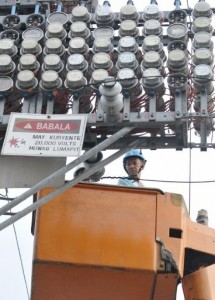Power problem poses risks to 2014 growth

Economic Planning Secretary Arsenio Balisacan has acknowledged that the power situation has become a key concern for the government, saying this could pose risks to the attainment of the country’s growth targets. AFP FILE PHOTO
Economic Planning Secretary Arsenio Balisacan has acknowledged that the power situation has become a key concern for the government, saying this could pose risks to the attainment of the country’s growth targets.
Balisacan said the government’s 2014 economic growth target of 6.5 to 7.5 percent did not take into account the potential effects of problems related to the country’s power supply.
“Obviously, the power problem will have an implication on inflation and growth of the economy [if left unresolved],” Balisacan told the Inquirer.
He said concerned officials were gathering proposals on how to address a potential power crisis, adding that President Aquino himself raised the importance of the matter during a recent meeting with his economic team.
“We cannot say at this point what actions would be taken, but we are studying the issue very closely,” Balisacan added.
There is a proposal in the legislature to give President Aquino an emergency power to address the problem in an immediate manner.
Balisacan said, however, that the specific proposal so far has not been discussed by the administration’s economic managers. The Palace also has not consulted the economic team about the merits of an emergency power.
An emergency power will allow the President to implement an easier and shorter process of inviting potential investors to do business in the country’s power sector.
Threats of a power crisis have been raised given the significantly rising demand for electricity that accompanies a robustly expanding economy. Last year, the economy grew faster than anticipated, resulting in an unexpected spike in demand for electricity.
The Philippines became one of the fastest-growing economies in Asia, expanding by 6.8 percent in 2010 and by an average of 7.4 percent in the first three quarters of 2013.
Unless bottlenecks in power supply are addressed, economists said the country could face costly power shortages.
Balisacan said that addressing the power situation was necessary given the dire need to sustain a robust economic growth.
Under the updated Philippine Development Plan (PDP) through 2016, which is expected to be released this month, the government will bank on the manufacturing sector, along with a few others, to help realize the poverty-reduction agenda.
Economists said the Philippines’ economic growth was not inclusive in that this was driven mainly by rising incomes of the middle class and the rich. They said the robust economic growth was meaningless for the poor as the poverty rate remained high at 25.2 percent in 2012.
Economists said the Philippines needed to sustain a robust growth of its manufacturing sector and the overall economy over the long term in order to help economic growth translate to a significant reduction in poverty.
